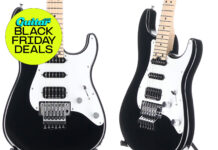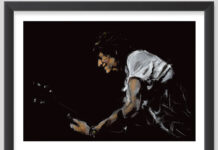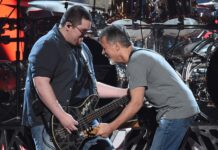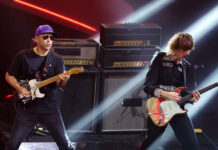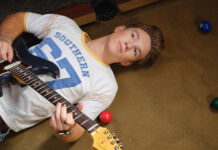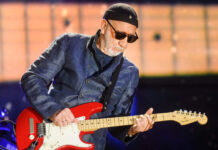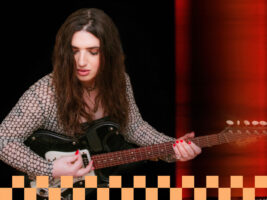
“I choose guitars that stay out of the way of the vocals” how Ella Feingold became the most versatile rhythm guitar player on the planet
Ella Feingold can count the likes of Johnny Marr, Lenny Kravitz and John Mayer as fans and she has worked with Erykah Badu, Janet Jackson, Bruno Mars and Jay-Z among others.
READ MORE: The essential guitar albums of 2025 that you (probably) missed
You’ll have also heard her orchestrating the music in Destiny – Bungie’s groundbreaking video game – and seen her incredible funky chops on display across your Instagram and TikTok FYPs. She’s even got a new album of duets in the pipeline with jazz legend Charlie Hunter, and an incoming solo project.
An artist that clearly contains multitudes, then – we have a lot to talk about…
Image: Press
Many of your new fans have found you through your funk tutorials on Instagram – you have a very appreciative audience online!
“I mean it’s funny. A lot of the things in my career happened long before social media, but I am really happy that people also seem to enjoy watching me look at these songs that I love.
“It’s like taking apart a telephone and putting it back together. I’m very curious and especially when I want to know how something works. That applies as much to the music of Sly Stone or James Brown as it does to the world of Jeff Buckley.
“There’s something so fun about finding a part that locks in and you just drive it straight home. Kool & the Gang’s Jungle Boogie is a great example. The guitar part appears so simple but you have to keep it going for the whole song – you just hold on to this thing for dear life. It’s not about ego or shredding – it is all about concentration and maintaining the groove.
“You have to understand the phrase, then you have to develop the stamina. It’s the same thing with James Brown. Check out Ain’t It Funky Now – it’s not hard to play, but that cut is 9 minutes and 36 seconds long. So, at 6 minutes, you might fuck up and you ruin the take and the whole band has to go back to the top.”
Who else should up and coming players listen to?
“Everyone should be familiar with Curtis Mayfield. He influenced Jimi Hendrix, Prince… so many more. John Mayer once told me, ‘Yeah, you just play how you are’, and Curtis Mayfield played in a really gentle soft-spoken kind of way while addressing some hard truths that are still relevant today.
“Then there is his ‘Black Key’ tuning of F#-A#-C#-F#-A#-F#, using the Maestro rhythm and sound effects unit – all that cool stuff. There’s something familiar and comforting about his playing. I think my favourite thing with musicians is their touch.”
Ella’s Hagstrom guitar. Image: Press
Funny you should say that: no less than Johnny Marr is a fan of your work for exactly that reason. How did you two meet?
“I had done an Instagram lesson on Jerome Smith who played guitar for KC and the Sunshine Band – little did I know that he’s one of Johnny’s top three favourite guitar players. So Johnny commented ‘Nobody knows about Jerome Smith!’ and my first thought is like, ‘Oh man, I thought that was the real Johnny Marr… that’s a bummer…’ because you know you get so many of those fake accounts. And I looked again and I’m like, ‘Oh fuck, it’s really him!’
“He invited me to a show he was playing in Boston. I didn’t know what to expect and when he saw me from across the room he grabbed my arm and we talked guitar for like – no exaggeration – three hours. To the point where the cleaning crew came in and his tour manager was like, ‘Johnny, you gotta get on the bus!’
“I love the Smiths and I love his guitar playing, but I didn’t get to grow up with that music – Siouxie and the Banshees, Magazine, and Adam and the Ants. So being friends with him, like he just started to hip me to all this amazing music. I have a chorus pedal now and I’m just like, man, you’re a bad influence on me!”
How does classic 70s funk mix with Jeff Buckley and indie textures?
“Jeff Buckley might be my favourite musician of all time. There’s so much I love. His touch on the guitar and how he makes it sound, and the chord voicings. Who else makes a Telecaster sound like that, you know? Maybe Ted Greene?
“Jeff learned a lot about guitar pedals and ambient stuff from Gary Lucas, I’m positive of that. You know, with the EHX 16-second delay?. I think his Quadraverb reverb stuff might have come more from Robin Guthrie and the Cocteau Twins.
“All roads lead back to Johnny Marr right? Like, I’m like playing him Jeff Buckley stuff backstage saying, ‘Johnny you don’t understand… this guy adored you. Do you know how many Smiths songs he covered?’ and you know, Johnny gets it.”
Ella’s guitar gear. Image: Press
You have a long-standing position in Erykah Badu’s band – how did that relationship come about?
“I was on tour with Queen Latifah. My first gig ever was 2005. It was sort of like a black Lilith Fair. It was Erykah Badu, Jill Scott, so many more – Erykah liked my playing and her MD asked me to join the band.
“It’s funny I’m working on Erykah’s new record right now, and there’s absolutely some Jeff Buckley influence in my playing on this music. My first gig with her was this VH1 Soul Stage concert, which was kind of infamous, and I’ve been working with her, on and off ever since.
“I can only think of a couple of occasions in twenty years where Erykah has verbalised what she needs from me. There was one time when she wanted me to step out front and solo and then on this record she just said, ‘Make it cry bitch!’ and that was it.
“That was easy. I literally took all of the oppression and fear I face as a trans woman and I put it into the guitar and it came out. If you want me to be dead honest, that’s where the cry comes from.
“But it’s all about the vocals – the storyteller. I just listen. You have to be sensitive. I choose guitars that stay out of the way of the vocals – I use a Gibson 345 with the Varitone on position 3 which scoops out a lot of the midrange. I fitted it with Bartolini pickups which are very 80s smooth jazz – the opposite of the analogue gritty stuff that I usually enjoy. This sound has punch in the bass and treble clarity and it fits the context.
“It’s like a conversation. Maybe you’re at a dinner party and someone talks like crazy, so you just go, ‘All right, I’ll just kind of listen and interject when I can’. With Erykah again, this has never been spoken but like she’s got Rhodes and keys. So she’s got all this buttery stuff so she doesn’t need me to do more of that. She needs some grease and something slightly itchy in there.”
Your duet album Different Strokes for Different Folks with Charlie Hunter has been getting high praise from legends like Bootsy Collins and Lenny Kravitz – how does that feel?
“This whole record really was like a musical conversation between two good friends, I talk to Charlie almost every day. It’s raw and it’s real and it feels good. I feel like it’s music that you can sort of complete for yourself. Pick up your sax, blow over it, drive down the street and lose yourself and just groove to it like it’s a beat tape. You know what I mean? It is raw funk.
“Charlie’s using a six string hybrid guitar – not the eight-string version – that opens things up and my guitar is in inverted standard tuning throughout. So that’s EBGDAE low to high. We boiled the whole thing down to its essence. The way it fused together was really cool, I hope people enjoy it!”
Your debut solo record 4-Track Ephemera is a return to analogue recording with a Tascam four-track tape recorder. What attracts you to the old school creative process?
“I wanted to return to a time when I was most in love with music, which was when I was a kid in the ‘90s during grunge. Buying guitar magazines and, you know, looking at articles and watching MTV and my parents getting me the 424 for Hanukkah and just like, God, I can jam with myself! So, I just set the stuff up in a guest bedroom. Not like, oh, I’m about to make a record. Just, well, just have fun.
“I started to share stuff on Instagram. Not like, ‘Yo, check this out’, just kind of where my head’s at and suddenly people were responding, ‘Oh my god, please put this out. You’re putting this out, right?’ The response was so positive I decided to go for it.
“It’s the first music where I’m comfortable introducing my influences to each other. You can hear Sly, J Dilla and Q-Tip, Tribe Called Quest and you can hear Jeff Buckley and you can hear Johnny Marr. I’m comfortable mixing all those things and trying to find my own sound. Like a cocktail.”
Different Strokes For Different Folks by Charlie Hunter and Ella Feingold is out now. 4-Track Ephemera is out 1 August
The post “I choose guitars that stay out of the way of the vocals” how Ella Feingold became the most versatile rhythm guitar player on the planet appeared first on Guitar.com | All Things Guitar.
Source: www.guitar-bass.net


